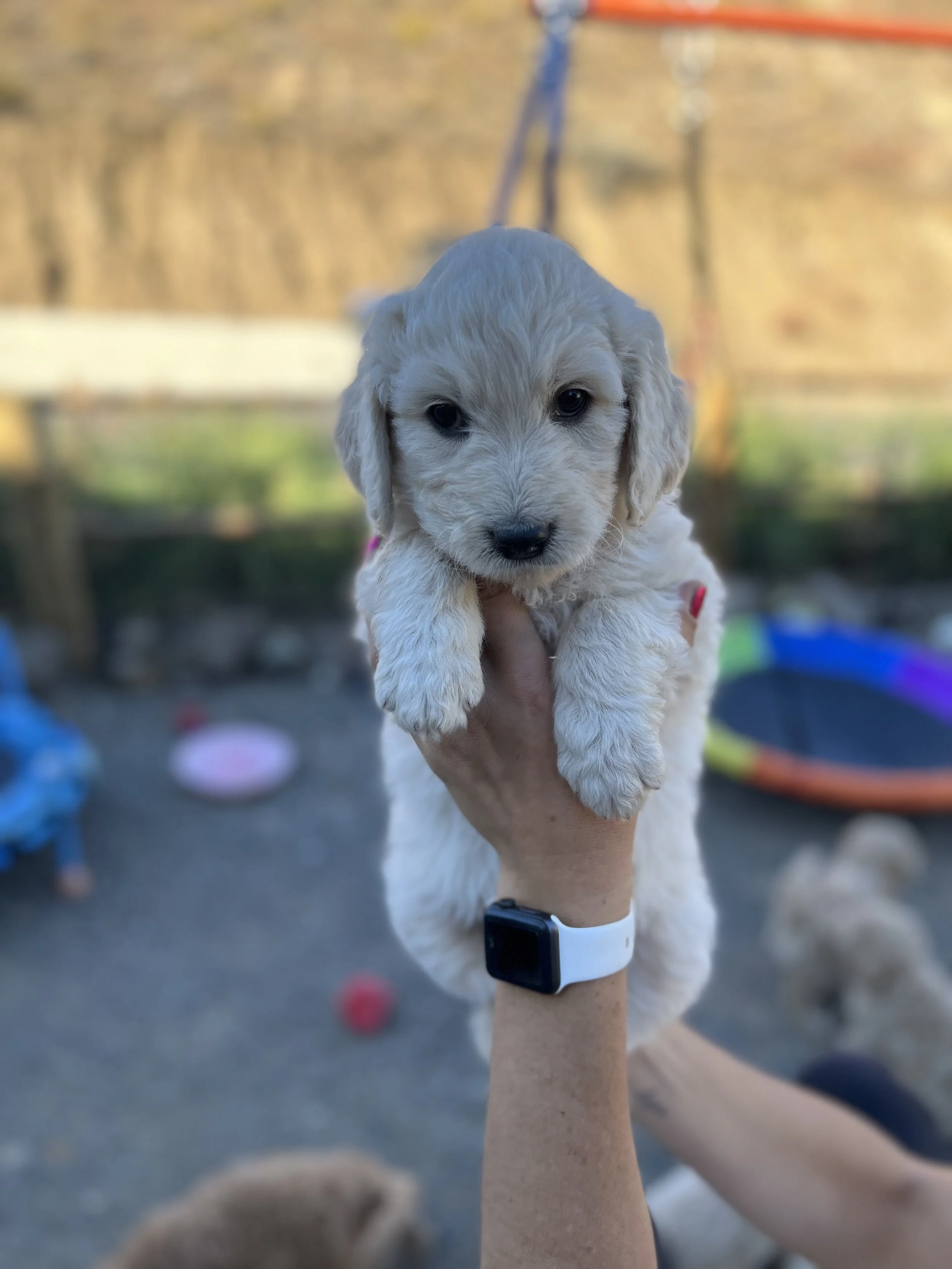Why is health testing your Doodles so important?
There are a lot of Goldendoodle and Bernedoodle breeders out there right now. Many of these are edited images on Facebook or Instagram, advertising the available Goldendoodle puppies along with a lifestyle, or just saying that their Bernedoodles were raised in a loving home. This sounds great, but it can also hide the fact that many of these doodle parents have not been health-tested, which could lead to ALOT of heartache and expense down the road. While a particular Bernedoodle or Goldendoodle puppy might be initially cheaper, the long-term fallout from not health-testing could cost thousands of dollars, along with the pain that comes from seeing the dog suffer.
So why do we health-test our Goldendoodle and Bernedoodle parents?
It’s because there are many health issues that can be inherited from Goldendoodle parents to Goldendoodle puppies, and many of those issues can be detected through either genetic or radiographic testing.
Many disorders - such as DM (Canine Degenerative Myelopathy; similar to ALS) - are genetically recessive, meaning that the puppy would need to inherit one copy from each of their parents in order to be affected by this disorder. These can be detected through a genetic-testing panel, so breeders can make sure they aren’t breeding two Bernedoodles together that carry a copy of the DM allele. This would prevent any puppies in that litter from being affected by DM.
There are a number of companies that provide test kits that use a saliva sample to test the doodle and see if they are carrying - or even affected - by any of these disorders. We tend to prefer either Canine Health Check or Embark, and each of them run between $150-100 per panel. They are highly reliable (over 99%), and are an easy resource to use.
Other issues - such as hip dyplasia or patellar luxation - can have strong hereditary connections. While environment does also contribute to this, when Goldendoodles who have loose hips are bred together, they have a higher likelihood of producing Goldendoodle puppies with loose hips. Likewise, if two mini-Bernedoodles who suffer from patellar luxation are bred together, their mini-Bernedoodle puppies also have a higher likelihood of having loose patellas.
Some Goldendoodle and Bernedoodle Health Issues
The risk of these physical abnormalities can be screened through radiographic screening and checkups. Hip dysplasia risk can be assessed through a few different tests, and we do two of them. The first is OFA hip screening, where they use one image and can do preliminary testing before the age of two and final testing after that age. The second is Pennhip testing, which uses three images to test for a Distraction Index (DI) and can be done as early as four months. From the research we’ve done, it seems like Pennhip has a slightly better ability at predicting the onset of hip dysplasia. Here’s some more information on why we do this testing on our Goldendoodle and Bernedoodle puppy parents and the difference between the two.
One thing to note is that unlike the genetic screening, these physical abnormalities cannot be prevented through testing the Bernedoodle parents. Instead, the risk can only be lessened. For instance, a puppy from Goldendoodle parents who each have “Excellent” hip scores can still develop hip displaysia, but it’s a significantly lower chance than for a puppy from dysplastic parents.
Since this can be pretty open, we feel its important to subject ourselves to a standard that’s been established by the Goldendoodle Association of North America and Good Dog. GANA awards different levels to breeders based on testing. The Gold Badge level - which we are and their highest level - requires a clearing hip, elbow, patellar, cardiac, and eye testing, along with not breeding parents together who each carry a copy of a disorder. Good Dog also requires the similar testing, and we have the highest health-testing ranking through them, “Excellent”.
I’ve noticed that there are many breeders out there who promote their health-testing, but aren’t subjecting the testing to a particular objective standard. Again, it’s important to note that we subject our bernedoodles to these standards here in Oregon, from Hillsboro to Prineville, not just our goldendoodles.
The Responsibility to Health Test Your Bernedoodle & Goldendoodle Puppy Parents
All of these tools are accessible to breeders, although each comes with it’s own level of investment, we feel like it’s part of our responsibility as a Goldendoodle and Bernedoodle breeder in Oregon to do what we can to ensure we are breeding healthy puppies that are set up to flourish throughout their lives. This can be tough; we’ve had to rehome a hopeful Goldendoodle parent from our program because she didn’t pass some testing, it’s a small price to pay for the peace of mind that we have.
We deeply want to go the distance to help our Bernedoodle and Goldendoodle puppies flourish, especially as the grow and age. We know the joy that comes from sharing your life with a doodle, and we know first-hand how difficult it is to journey with a dog who has significant health issues.
We believe in the puppies we raise; if you do too, then go ahead and follow along or even apply for one our Goldendoodles and Bernedoodles.
Warmly,
Erin and Jay




